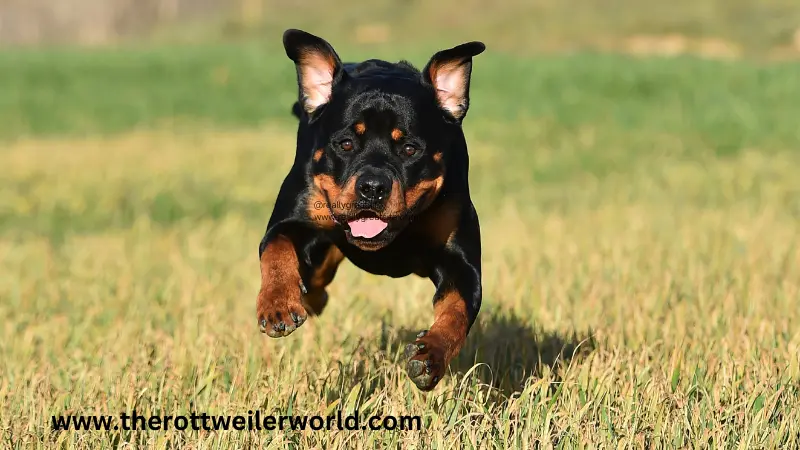Rottweilers are known for their strong build and loyal nature. Understanding their weight is important for keeping them healthy and happy. This guide will help you learn about the ideal weight ranges, growth stages, diet, exercise, and health issues related to Rottweiler weight.
Key Takeaways
- Rottweilers have different weight ranges for males and females, with males typically heavier.
- Proper diet and nutrition are crucial for maintaining your Rottweiler’s ideal weight.
- Regular exercise is essential to prevent obesity and keep your Rottweiler healthy.
- Monitoring your dog’s weight can help you catch potential health problems early.
- Understanding the growth stages of a Rottweiler can help you manage your weight effectively.
Ideal Weight Range for Rottweilers
Understanding the ideal weight range for Rottweilers is crucial for maintaining their health and well-being. Male Rottweilers typically weigh between 95 and 135 pounds, while females usually weigh between 80 and 100 pounds. These weight ranges reflect their robust and muscular build, which is essential for their role as working dogs.
Weight Differences Between Males and Females
Male and female Rottweilers have different weight ranges due to their size and build. Males are generally larger and heavier, standing between 24 and 27 inches tall at the shoulder. In contrast, females are slightly smaller, with a height range of 22 to 25 inches. This difference in size contributes to the variation in their weight.
Factors Influencing Rottweiler Weight
Several factors can influence a Rottweiler’s weight, including genetics, diet, and exercise. Genetics plays a significant role, as some Rottweilers may naturally be larger or smaller than others. Diet and nutrition are also critical, as a balanced diet helps maintain a healthy weight. Regular exercise is essential to prevent obesity and keep your Rottweiler fit.
Importance of Maintaining Ideal Weight
Maintaining the ideal weight for your Rottweiler is vital for their overall health. An overweight Rottweiler is at risk of developing health issues such as joint problems, heart disease, and diabetes. On the other hand, an underweight Rottweiler may suffer from malnutrition and a weakened immune system. Regular weight checks and a balanced diet can help ensure your Rottweiler stays within the ideal weight range.
Growth Stages and Weight Milestones
Puppyhood: Birth to 6 Months
During the first six months, Rottweiler puppies experience rapid growth. Typical weight ranges and milestones vary across these stages. Neonatal puppies weigh only a few ounces, while those in the transitional stage typically tip the scales at 5-19 pounds. By the end of this period, they can weigh between 40-60 pounds. Observing signs of healthy growth, such as a sleek and shiny coat, consistent weight gain, and alert behavior, is essential.
Adolescence: 6 to 18 Months
In adolescence, Rottweilers continue to grow, but at a slower pace. They gain muscle mass and start to look more like adult dogs. Males tend to exhibit a slightly more prolonged growth period, both in terms of height and weight. By 18 months, they usually weigh between 80-110 pounds. Owners should be vigilant for signs of unhealthy growth, such as limping or reluctance to move, which may indicate developmental issues.
Adulthood: 18 Months and Beyond

Once Rottweilers reach adulthood, their weight stabilizes. Adult Rottweilers typically weigh between 80 to 135 pounds. Regular veterinary check-ups and open communication with a veterinarian are key to proactively managing and addressing any potential issues that may arise during this stage. Maintaining a healthy weight is crucial for their overall well-being.
Diet and Nutrition for Optimal Weight
Rottweilers are a large and active breed that needs a diet high in protein to support their muscle mass and energy needs. It’s crucial to feed them a high-quality diet that meets their nutritional requirements and to avoid overfeeding, as Rottweilers are prone to obesity.
Essential Nutrients for Rottweilers
Opt for dog foods that contain sources of omega-3 and omega-6 fatty acids such as fish oil, flaxseed, or chicken fat. These nutrients are vital for maintaining a healthy coat and skin. Additionally, ensure the diet includes a good balance of proteins, fats, carbohydrates, vitamins, and minerals.
Feeding Guidelines by Age
- Puppies: Require a diet higher in calcium to support their growing bones. Feed them life-stage appropriate food.
- Adults: Should be fed twice a day to regulate their digestion and energy levels. Choose low-fat dog food with high nutritional value to prevent obesity.
- Seniors: May need fewer calories but still require a balanced diet to maintain their health.
Common Dietary Mistakes to Avoid
- Overfeeding: Rottweilers are prone to obesity, so it’s important to measure their food and avoid giving too many treats.
- Inconsistent Feeding Times: Feed them at consistent times to help regulate their digestion and energy levels.
- Ignoring Nutritional Needs: Always consult a veterinarian to ensure your Rottweiler diet meets their specific needs.
When you feed your dog a healthy diet, they have more energy, fewer health problems, and are less likely to develop obesity.
Health Issues Related to Weight
Obesity and Its Consequences
Obesity in Rottweilers can lead to a range of serious health problems. Excess weight puts extra stress on their joints, which can worsen conditions like hip and elbow dysplasia. Additionally, overweight Rottweilers are at a higher risk for heart issues, such as cardiomyopathy. Regular exercise and a balanced diet are crucial to prevent obesity.
Underweight Rottweilers: Causes and Solutions
Rottweilers that are underweight may suffer from underlying health issues like hypothyroidism, which can cause weight loss and lethargy. Allergies and skin conditions can also contribute to a lack of appetite. It’s important to consult a vet to identify the root cause and develop a treatment plan.
Monitoring and Managing Weight-Related Health Problems
To keep your Rottweiler healthy, regular weight checks are essential. Use a reliable scale and keep a record of their weight over time. If you notice significant changes, consult your vet immediately. They can help you adjust your dog’s diet and exercise routine to maintain an ideal weight.
Keeping a close eye on your Rottweiler’s weight can prevent many health issues and ensure they live a long, happy life.
Exercise and Activity Levels
Recommended Exercises for Different Life Stages
Rottweilers have a moderate energy level and need regular exercise to stay healthy and happy. A daily routine should include walks, playtime, and mental stimulation. They benefit from activities like running, hiking, and obedience training to meet their exercise needs.
Balancing Activity and Rest
While Rottweilers are known for their strength and endurance, too much exercise, especially when they are young, can lead to joint problems. Controlled and age-appropriate exercise helps build muscle, supports heart health, and aids in keeping an ideal weight. Regular, moderate activities, such as leash walks, play sessions, and obedience training, contribute to a well-rounded and physically fit Rottweiler.
Signs of Overexertion and How to Avoid It
It’s important to watch for signs of overexertion in your Rottweiler. These can include heavy panting, limping, or reluctance to continue exercising. To avoid overexertion, ensure your dog has plenty of water and takes breaks during intense activities. Always listen to your dog’s needs and adjust your exercise routines accordingly.
Monitoring Your Rottweiler’s Weight
Tools and Techniques for Accurate Weighing
To keep track of your Rottweiler weight, you can use a variety of tools. The digital scale is often the most accurate. For smaller dogs, a baby scale might work, while larger dogs may need a veterinary scale. Make sure to weigh your dog at the same time of day to get consistent results.
Frequency of Weight Checks
Regular weight checks are important. For puppies, you might want to weigh them weekly. Adult Rottweilers can be weighed monthly. Keeping a log of these weights can help you notice any sudden changes.
Interpreting Weight Changes and When to Consult a Vet
If you see a sudden increase or decrease in your dog’s weight, it might be time to consult your vet. Early detection of weight issues can prevent more serious health problems. Look for other signs like changes in appetite or energy levels, which can also indicate health issues.
Regular check-ups with your vet are essential for catching potential problems early. This proactive approach ensures your Rottweiler stays healthy and happy.
Breed-Specific Weight Considerations
Comparing Rottweilers to Other Large Breeds
When exploring the different types of Rottweilers, it’s helpful to compare them to other large breeds. For instance, male Rottweilers typically weigh around 120 lb (55 kg), while females weigh about 90 lb (42 kg). In contrast, Great Danes can weigh between 110-175 lb (50-79 kg), and Bullmastiffs range from 100-130 lb (45.4-59 kg).
| Breed | Male Weight (lb) | Female Weight (lb) |
|---|---|---|
| Rottweiler | 120 | 90 |
| Great Dane | 110-175 | 110-175 |
| Bullmastiff | 100-130 | 100-130 |
Genetic Factors Affecting Weight
Genetics plays a significant role in a Rottweiler’s weight. Certain genetic lines may produce larger or smaller dogs. It’s important to understand your dog’s lineage to predict their potential size and weight.
Role of Breeding in Weight Variations
Breeding practices can also influence weight. Responsible breeders aim to maintain the breed standard, which includes ideal weight ranges. However, some breeders may prioritize size, leading to heavier dogs. Always choose breeders who prioritize health over size.
Understanding the different types of Rottweilers, including German, American, and Roman varieties, can help you better predict your dog’s weight and size.
Conclusion
Understanding the weight and growth of your Rottweiler is key to ensuring they lead a healthy and happy life. By keeping an eye on their size and weight, you can help prevent health problems and make sure they are growing as they should. Remember, every Rottweiler is unique, and their growth can vary. Always consult your vet for the best advice tailored to your furry friend. With the right care, your Rottweiler will be a loyal and loving companion for years to come.
Frequently Asked Questions
Male Rottweilers usually weigh between 95 and 135 pounds. It’s important to keep them within this range to ensure they stay healthy.
Female Rottweilers typically weigh between 80 and 100 pounds. Keeping them within this range helps maintain their overall health.
Monitoring your Rottweiler’s weight helps prevent health problems like obesity or being underweight. Both conditions can lead to serious health issues.
Avoid overfeeding, giving too many treats, and not providing a balanced diet. These mistakes can lead to weight and health problems.
It’s a good idea to check your Rottweiler’s weight every month. Regular checks can help you spot any changes early and take action if needed.
If your Rottweiler is overweight, consult your vet for a proper diet and exercise plan. They can guide you on the best way to help your dog lose weight safely.











